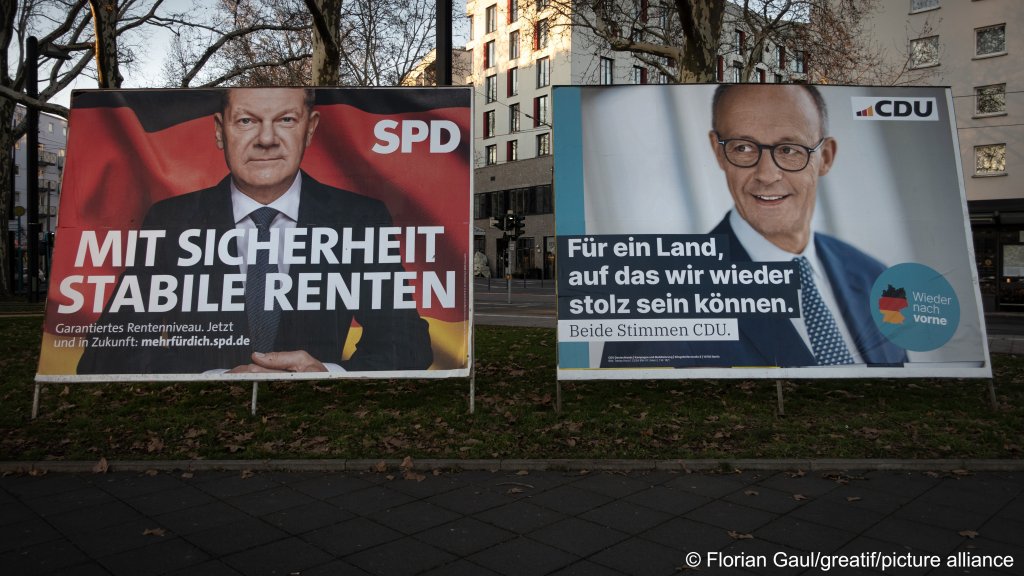With snap federal elections slated for February 23, InfoMigrants takes a look at the election manifestos of Germany's top seven political parties in terms of migration. Today we look at the SPD (Social Democratic Party), which is mostly continuing its liberal approach towards migration in the wording of its manifesto.
For the upcoming German elections, InfoMigrants takes a closer look at where the top seven political parties stand on migration and asylum policy. Thus far, we have published a summary of the Conservatives (CDU/CSU) policy proposals and the Alternative for Germany (AfD); we will also publish overviews on the Greens, BSW, FDP and Left party within the next few weeks.
The Social Democrats (SPD) are known as a moderate left-of-center party, which traditionally attracted many votes from the working class as well liberal-minded Germans. In 2019, it came as a surprise that the SPD was mandated with building a coalition government after it had been trailing in polls for a while.
However, the coalition of SPD, Greens and FDP (Free Liberals) eventually collapsed in November last year, necessitating early elections, which come amid an increasingly xenophobic atmosphere across Germany.
A number of SPD-led initiatives to facilitate legal migration over the past few years are now facing criticism from the opposition, forcing the SPD to reformulate some of its approaches without veering too much from its overall ideology.
It is, however, highly unlikely that Chancellor Olaf Scholz of the SPD will be re-elected for a second term, as surveys suggest that the party now trails at third place with around 15 percent of the vote.

Building on recent developments
The motto of the SPD manifesto for the February 2025 elections translates as "More for you. Better for Germany." and is comprised of 68 pages of information on all policy aspects the party would like to champion.
On the specific issue of migration and immigration in general, the SPD highlights early in its manifesto the gains of the past four years as the basis it wishes to build on, while also acknowledging the importance of security issues.
"We have successfully limited irregular migration -- and at the same time, continue to welcome those who want to work here in Germany. With our new citizenship law, we are making it possible for all our fellow human beings to become fellow citizens with all the rights this entails."
While the SPD appears to want to continue its liberal course on immigration and integration of foreigners, the manifesto also features uncompromising wording on people who harm others, after a series of deadly attacks in Germany in recent months.
Read AlsoGermany: Aschaffenburg attack prompts political blame game
Safety and security first
However, a few pages onwards, the documents also stresses that the SPD aims to "fight for internal and external security and consistently oppose the enemies of an open society," referring to both domestic and foreign terrorists and their supporters. The manifesto stresses that all enemies of democracy must be countered in equal terms:
"We combat discrimination, racism, right-wing extremism, anti-Semitism, Islamism and all other forms of group-related misanthropy. In doing so, we seek to join forces with all democrats and organizations for a strong civil society."
"Together with a strong community of democratic citizens, we want to defend freedom, justice and solidarity against old and new enemies of democracy."
The SPD adds that in the fight against extremism, it will focus first and foremost on "prevention measures" in order to combat extremism and anti-democratic tendencies, in particular when it comes to Islamism as well as far-right extremism.
Read AlsoGermany: Magdeburg attack could shape upcoming election
Focus on legal migration and labor
The SPD manifesto says that "Germany has long benefited from the fact that we are a country of immigration," which is a definition and a view not necessarily shared by other parties such as the AfD.
"We treat people with respect, regardless of where they have their roots; with clear and comprehensible rules, less bureaucracy and a much more transparent and simplified recognition of degrees and qualifications acquired abroad," the manifesto continues, referring to legal ways of immigration based on skilled labor, such as the Skilled Immigration Act, which was introduced last year.

The SPD adds that is seeks to "enable successful immigration by expanding and permanently and adequately funding the structures necessary for successful integration, such as integration courses alongside work, widely available German language support and advisory services."
This is in contrast to other parties, which have expressed plans to cut certain integration measures.
Furthermore, the SPD says that it hope to facilitate the integration of recognized refugees into the labor market "in order to enable refugees to take up employment as early as possible," potentially hinting at a possible bill to allow refugees to start work even before being granted asylum.
Combatting irregular migration at its core
The SPD states that its strategy to limit irregular migration is to focus on combatting human smuggling. To this end, it suggests that "working closely with our neighbors" would be its preferred approach.
The manifesto says it wants to disincentivize smuggling by ensuring that "smugglers are severely punished and consistently deported."
Furthermore, the document highlights the idea that "increased development cooperation" in countries of origin would also help mitigate the main causes of migration.
"We want Germany to help promote political and economic stability in crisis regions, rebuild destroyed structures after conflicts and create better education and employment opportunities locally."
Read AlsoGermany approves parts of new security package, but discussions continue
Better education – also for foreigners
The manifesto also highlights the importance of having an "education system fit for an immigration society," in Germany, which is designed to give "children from different backgrounds every opportunity to successfully attend nurseries and schools."
"The best education needs strong and sustainable funding from the state as a whole. We therefore want to reform inheritance and gifting tax in order to be able to invest specifically in better education for all children and young people," the SPD outlines.
The SPD manifesto also calls for a shift in the overall education system "to reflect diversity in syllabi, textbooks and teaching professions."

Less bureaucracy and more streamlined procedures
The SPD also wants to simplify all bureaucratic steps involved in immigration matters, focusing on digitization. "Our goal is an administration that meets the needs of citizens, acts proactively and reduces bureaucracy to what is really necessary," the manifesto states.
With immigration issues, the SPD wants to facilitate the digital exchange of information between the federal and state governments.
"We are committed to significantly speeding up asylum procedures - both at the Federal Office for Migration and Refugees as well as in administrative court proceedings."
"This includes modernizing the Central Register of Foreigners (AZR) and making it the central information platform for foreigners and asylum law. Data will only be recorded once and made available digitally to all relevant authorities."
The SPD also wants to hold on to recent changes in citizenship law, which make it easier for foreigners to qualify for German citizenship; opposition parties, however, have already announced that they might seek to undo the new law.
Family reunions to remain cornerstone of asylum policy
Despite political moves by various parties to curb or even completely stop family reunions of recognized asylum seekers, the SPD says it won't change the status quo.
"We will continue to facilitate family reunions for persons in need of … protection, as it is a crucial prerequisite for successful integration."
However, it is unclear how existing family reunion programs will be handled moving forward, as there are no policy statements on this.
Deportations and third-country asylum procedures
Meanwhile, for failed asylum seekers, the SPD says it will pursue a policy of deportation that will be "carried out humanely and consistently."
"We prefer voluntary departures as they are more humane. If this is refused, we rely on swift and consistent deportations, especially in the case of criminals," the manifesto states.
Furthermore, the SPD also comes out in opposition to the idea of externalizing asylum procedures to third countries in its election manifest.
"People seeking protection must have access to fair and constitutional procedures in the EU," the party states.

Demographic changes mitigated by migration
The SPD manifesto also addresses the issue of why Germany – in its view – should try to attract more immigrants.
"As an ageing society, we are dependent on immigration," the document states squarely, going into further detail with people who come to Germany on account of fleeing persecution.
"Immigration to Germany for reasons of asylum and flight continues to present us with major challenges. We are responding responsibly at all levels with humanity and order," the manifesto says.
"We grant protection to those who need it. Anyone who has not been granted protection status as a refugee and has nevertheless managed to integrate into the labor market and society and is free of criminal convictions should be given the opportunity to switch to skilled immigration," the document specifies while also stressing in the same paragraph that "those who do not abide by the rules must leave."
Read AlsoHow immigrant voters could determine the German election
Support for East Germany to combat racism
Interestingly, the SPD manifesto also highlights the importance of continuing the funding of "structurally weak regions in eastern Germany."
The SPD says it wants to continue to develop Eastern Germany "into competitive and liveable regions" in hopes of mitigating a growing overall trend towards radicalization there.
Since the reunification of Germany in 1990, the federal states of the former communist GDR (German Democratic Republic) have been suffering a steep rise in far-right support and rising xenophobia, in particular when it comes to the Neo-Nazi scene.
To this end, the SPD wants to keep a special tax (Solidaritätszuschlag) but only for the highest earning individuals in Germany. Some other parties meanwhile are campaigning for an abolition of the tax.
Keeping borders as open as possible
Despite the fact that the SPD-led coalition introduced additional border checks in 2024 in response to various developments, the manifesto states that "(b)order closures … contradict the spirit of a common [EU] area of freedom, security and justice. The temporary reintroduction of internal border controls must therefore remain the absolute exception."
It also highlights that "blanket rejections at internal [EU] borders" – and idea floated by the CDU/CSU as well as the AfD – is also not in the spirit of European unity.
Instead, the SPD says it wants to shift the focus to the EU's external borders, which it says need "to be better protected and controlled."
"In doing so, all rule of law and humane conditions must be guaranteed at all times," the manifesto says, while stressing that the use of push-backs anywhere in the EU would be rejected by the SPD.
You can read the SPD manifesto in German in full here. There's also an English synopsis available.
